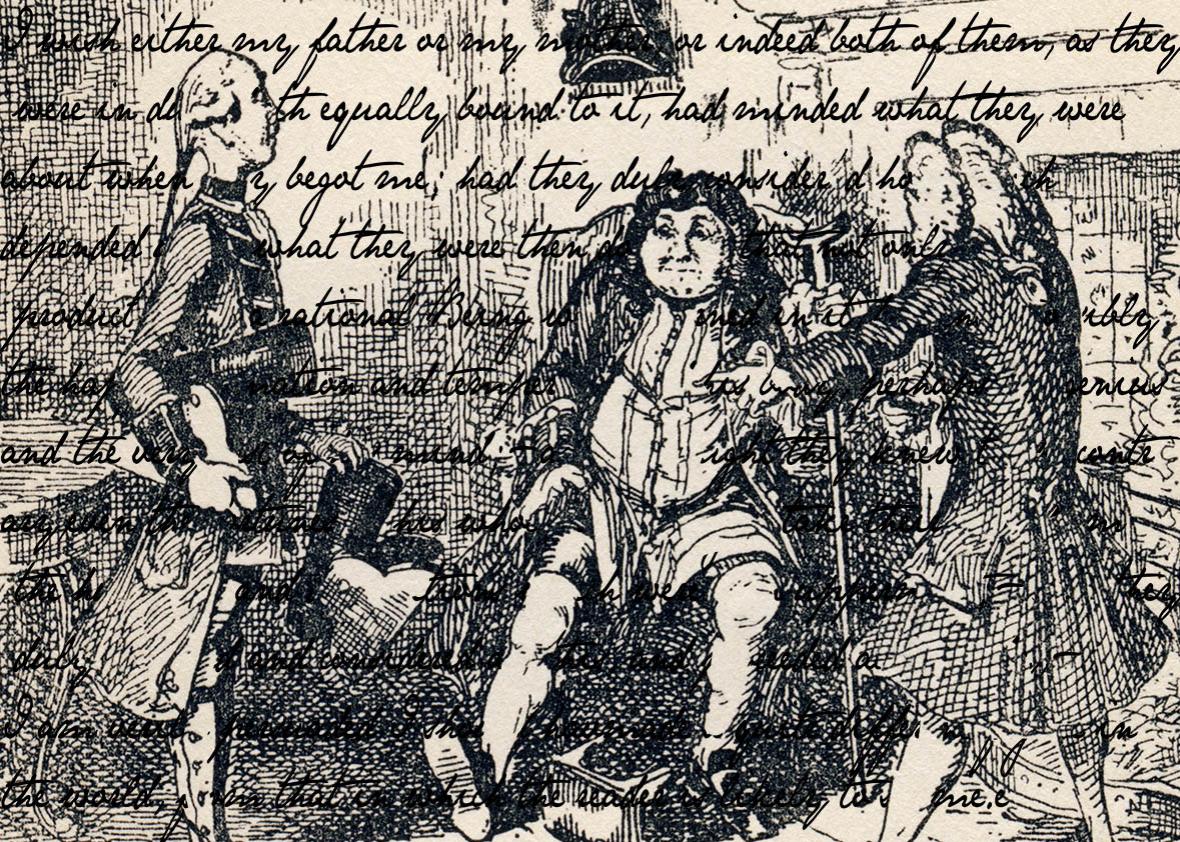This article is part of A Year of Great Books, a Slate Academy. To learn more, read Laura Miller’s introduction to the series, or visit Slate.com/GreatBooks.
When considering the great first lines to novels, we tend to prize concision (“Mrs. Dalloway said she would buy the flowers herself.”) and grace (“It is a truth universally acknowledged …”). For me, the greatest lede in English literature is neither concise nor graceful. It’s the gawky first sentence of The Life and Opinions of Tristram Shandy, Gentleman. Like the novel it inaugurates, the sentence is long and frantic and riddled with em-dashes and semicolons and brief, improvisatory phrases that hurriedly qualify a previous assertion. The prose veers between writing and conversation. There’s mounting surprise and inappropriate humor and not a little sadness. In comparison, “Call me Ishmael” sounds like a Twitter bio. Shandy starts like this:
I wish either my father or my mother, or indeed both of them, as they were in duty both equally bound to it, had minded what they were about when they begot me; had they duly consider’d how much depended upon what they were then doing;—that not only the production of a rational Being was concerned in it, but that possibly the happy formation and temperature of his body, perhaps his genius and the very cast of his mind;—and, for aught they knew to the contrary, even the fortunes of his whole house might take their turn from the humours and dispositions which were then uppermost;—Had they duly weighed and considered all this, and proceeded accordingly,—I am verily persuaded I should have made a quite different figure in the world, from that in which the reader is likely to see me.
This long sentence is a marvel of compression. Sterne establishes several things immediately. One: Tristram is a highly strung gentleman with certain inherited superstitions, who has read enough Enlightenment philosophy that he can casually misuse Lockean buzzwords (“production of a rational Being”) while complaining about his parents. Two: Tristram is an invalid, prone to confession and innuendo. Three: There is no epistolary or third-person narrator to impose distance between the reader and the text. Tristram hems and haws, but his frankness lends all this talk of fortunes and genius a tone of curious intimacy.
Perhaps most important: I have known first-time readers so tickled and/or bedeviled by the apologetic weirdness of these lines that they almost miss the fact that the novel is opening with a short, dismal sex scene.
Remember that Sterne was a clergyman of 46 who had written many sermons and published more than a few; that Shandy was his first novel; that the reading public knew he was a clergyman; that high-Church clerics are not meant to propagate pornography. Many critics responded with censure, and Sterne would use their broadsides as material for digression and self-commentary as he composed subsequent volumes in Tristram’s “autobiography.” Sterne flirted with the idea that Tristram was his stand-in—they share a literary style, and they both have consumption—but in fact he was Sterne’s alter ego, his Ziggy Stardust, a bizarro self-rendering that allowed him to tell an epic of high comedy and surprising emotional power, all while making him fabulously rich.
Shandy’s opening is stranger still when we compare it with the coy self-effacement of the narrator in David Copperfield:
Whether I shall turn out to be the hero of my own life, or whether that station will be held by anybody else, these pages must show.
… or with the arch pronouncements of the narrator in Northanger Abbey:
No one who had ever seen Catherine Morland in her infancy would have supposed her born to be an heroine.
Dickens is being cute (although he’s also doing character work—that line is exactly what David would say in a book that bears his name), while Austen is poking fun not at her character but at the reading public. But however much they wink, these approaches are eminently contained. The opening sentence in Shandy, like everything else in the novel, defies containment. It is sweet and sad and confusing and a little creepy and in the end radically funny, because self-consciousness is natural to human self-presentation, yet no author had created comic fiction on that premise before. For this reason, Shandy’s comedy cuts toward truth—because, depending on the day, we all think like Tristram. We lament what might have been, wonder why people see us the way we assume they do, break off midthought and circle back to a previous fragment. Our reason depends much more than we admit on the “humours and dispositions” of a given moment.
Like all self-conscious people, Tristram is also self-oblivious, and Sterne’s narration makes use of that to create a double effect: the joke that Tristram is making (I’m such a loser) but also the larger joke that Sterne is making from an ironic distance (Check out this guy’s weird superstitions about sex). That complicated dialectic informs the entire novel—and Sterne lays it all out in the first sentence. The clock has been wound, and the novel’s strange motions begin to lurch with their own particular grace.
